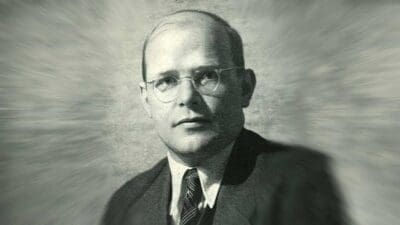When posed with the question of whether he believed in God, Albert Einstein’s response defied expectations. Rather than offering a conventional answer, he remarked, “I believe in Spinoza’s God, who reveals himself in the orderly harmony of what exists”.
But who was Spinoza, and what made his philosophy so ground-breaking? How does his radical vision of God and nature continue to shape our thoughts on freedom, happiness, and the pursuit of knowledge?
To grasp why Spinoza’s ideas were so transformative, it’s essential to understand his life and the context that moulded him…
Baruch Spinoza was born in 1632 in Amsterdam within a Jewish community that had found refuge there after fleeing persecution in Spain and Portugal. This community was steeped in strict religious traditions and a fervent desire to safeguard their faith and culture, which Spinoza ultimately found himself at odds with.
From a young age, Spinoza displayed a keen intellect and an insatiable thirst for learning. He received rigorous education in the Hebrew Bible, Talmud, and Jewish philosophy, quickly showing promise as a scholar.
However, he was equally captivated by the new scientific and philosophical ideas spreading across Europe – ideas that challenged established beliefs. Thinkers like René Descartes and Galileo were revolutionizing the way people understood the universe, and Spinoza was drawn to their emphasis on reason, inquiry, and observation.
Spinoza’s engagement with these new ideas led him to develop his own views – views that ultimately put him at odds with his community.
In 1656, at just 23 years old, Spinoza was excommunicated from the Amsterdam Jewish congregation. His beliefs were considered heretical – a grave charge that severed him from family, friends, and cultural heritage. Though the precise reasons for his excommunication are not documented, scholars believe it was due to his controversial ideas about God, religious authority, and reality – ideas he would later expand into his comprehensive philosophical system.
This break from his community profoundly impacted Spinoza’s life. While he lost formal religious ties, he gained intellectual freedom. Living modestly as a lens grinder, he devoted himself to philosophy and writing, gaining recognition among a small circle of intellectuals as an independent and deeply original thinker.
His personal experiences with religious and intellectual exclusion fuelled his advocacy for freedom of thought and tolerance. He witnessed first-hand the limitations of dogma and the power of open inquiry.
One of Spinoza’s earliest works, “Tractatus Theologico-Politicus” (Theological-Political Treatise), is a defence of intellectual freedom. It argues that true understanding cannot be achieved through rigid religious doctrines but through rational inquiry.
The challenges Spinoza faced – his excommunication, modest lifestyle, and commitment to intellectual freedom – all contributed to his revolutionary perspective on God and nature. Through these experiences, he developed a vision of reality that was far ahead of its time.
At the core of Spinoza’s philosophy is a radical idea: God and nature are one and the same.
Unlike traditional religious views of a personal God existing outside and above the world, Spinoza believed everything is interconnected as part of a single divine substance.
This concept is encapsulated in his famous phrase “Deus sive Natura” meaning “God or Nature.” For Spinoza, these terms are interchangeable, and understanding this oneness is key to comprehending his entire philosophy.
In his book Theological-Political Treatise, Spinoza discussed the inconsistencies that result when God is assumed to have human characteristics. In the third chapter of the book, he stated that the word “God” means the same as the word “Nature“. He wrote: “Whether we say … that all things happen according to the laws of nature, or are ordered by the decree and direction of God, we say the same thing”.
Spinoza argued that God is not a separate creator who actively intervenes in the universe; instead, God is the universe itself – the very fabric of existence. According to Spinoza, everything from the smallest particle to the vast cosmos is part of this one substance governed by natural law.
This idea, known as pantheism, was revolutionary because it rejected the view of God as an all-powerful personal deity with human-like qualities.
Instead, Spinoza’s God is impersonal, devoid of desires, intentions, or emotions, manifesting purely through the laws of nature. In his major work “Ethics,” Spinoza meticulously explains this idea using geometric proofs, aiming for a logical and rigorous understanding of existence.
He presents God as the only substance – an infinite self-sustaining being that encompasses everything. From this one substance flows everything else: thoughts, matter, emotions, and even our sense of individuality.
According to Spinoza, individual beings like us are simply modes or expressions of this substance – temporary forms within the eternal reality of God or Nature.
This worldview was and remains controversial. By equating God with nature, Spinoza undermined traditional religious notions of a creator who judges, rewards, or punishes. For him, concepts like good and evil are human interpretations rather than divine truths.
From the grand sweep of empires rising and falling to the tumultuous power of natural disasters, everything in the natural world unfolds according to unchanging laws, not the whims of a moral deity. For Spinoza, every occurrence is an essential part of the universe’s framework, not the outcome of divine intervention.
This perspective challenges our understanding of human freedom. While we might feel as though we act independently, Spinoza argued that all events, including human actions, adhere to a strict chain of cause and effect. Just as planets orbit under the influence of gravity, we act according to causes we might not fully grasp.
However, Spinoza saw this not as a constraint but as an opportunity. He believed true freedom comes from comprehending the necessity of nature’s laws and embracing our role within this vast order. The more we align ourselves with this rational perspective, the freer and more fulfilled we become.
Spinoza’s vision offers a holistic way to view the world, suggesting that we are not separate entities but integral parts of a vast interconnected whole. In his eyes, true wisdom and happiness stem from acknowledging this interconnectedness and realizing that our experiences – thoughts, emotions, and challenges – are elements of a larger rational order.
His philosophy was not merely an abstract idea; it was a practical guide for living. In his masterpiece “Ethics,” Spinoza laid out a life rooted in understanding and rationality, where genuine freedom is achieved through self-awareness and harmony with nature. His approach to ethics transcends rigid moral codes, emphasizing the use of reason to understand ourselves, our desires, and the world around us.
For Spinoza, freedom is intricately linked with knowledge. He contended that while we might feel free, our actions are often driven by emotions and external influences beyond our understanding. Emotions like fear, anger, or jealousy emerge from misunderstandings about ourselves and our environment.
According to Spinoza, these emotions are natural but can ensnare us in a form of bondage, limiting our freedom. The path to overcoming this lies in understanding the causes behind our emotions and the natural laws governing them. By studying these patterns and causes, we can manage our emotions, finding peace instead of being swayed by every fleeting feeling.
Ethical living, for Spinoza, involves recognizing our place within the broader order of nature. Since everything is interconnected, he saw virtue not as isolated acts but as living in harmony with the natural world.
Virtue means acting according to reason’s guidance, aligning our actions with our understanding of nature’s laws. Doing so enables us to live in accordance with the universe’s rational structure, which Spinoza considered the highest form of happiness.
One of Spinoza’s central ethical concepts is “conatus” (note: roughly translates to “endeavour”) – the innate drive in all things to persist and thrive.
This drive is the essence of every being, including humans. Living ethically means pursuing this inner drive but doing so in a way that harmonizes with reason and the broader natural order. This doesn’t entail selfishness but rather acting in ways that promote our growth and well-being while respecting our interconnectedness with others.
Spinoza’s ethical system provides a unique path to freedom and happiness centred on self-understanding, rationality, and interconnectedness.
Spinoza’s ideas not only challenged his contemporaries but also helped shape modern thought. Despite facing censorship and condemnation during his life, his works influenced thinkers who carried his ideas forward, making him a pivotal figure in philosophy, science, and politics.
His impact is evident in the Enlightenment – a movement dedicated to reason, science, and intellectual freedom. Thinkers like Voltaire, Rousseau, and even Kant were deeply affected by Spinoza’s approach to reason and ethics.
His Theological-Political Treatise advocated for freedom of thought and expression, laying groundwork for modern democratic thought. Spinoza envisioned a state that enabled individuals to live rationally and freely.
The best government promotes collective well-being through reason rather than force or religious doctrine. This focus on a rational society provided an early foundation for secular democracy and constitutional government.
In modern philosophy, Spinoza’s ideas continue to inspire debates on freedom, identity, and consciousness. His view of emotions as natural reactions that can be understood resonates with fields like psychology and neuroscience today.
Understanding mental processes is key to improving well-being. His insights into interconnectedness speak to current ecological and ethical movements recognizing responsibilities to each other and the planet.
Spinoza’s concept of rational freedom – achieved through understanding rather than external control – influenced existential and humanistic philosophies. True freedom comes from within; this foreshadowed ideas later developed by philosophers like Jean-Paul Sartre and Viktor Frankl, who emphasized personal responsibility and self-determination.
Spinoza’s philosophy addresses modern struggles with fragmentation and conflict in a divided world. His vision of unity and rationality provides a path to a more integrated life. He believed true freedom arises from understanding natural laws within us and around us.
Spinoza championed the power of critical thinking and the liberty to delve into ideas, underscoring the vital role of intellectual independence. He believed that a society flourishes most when its people are free to ponder, question, and pursue knowledge – a notion that serves as the backbone for many of today’s democratic ideals.
May your quest be fruitful!




